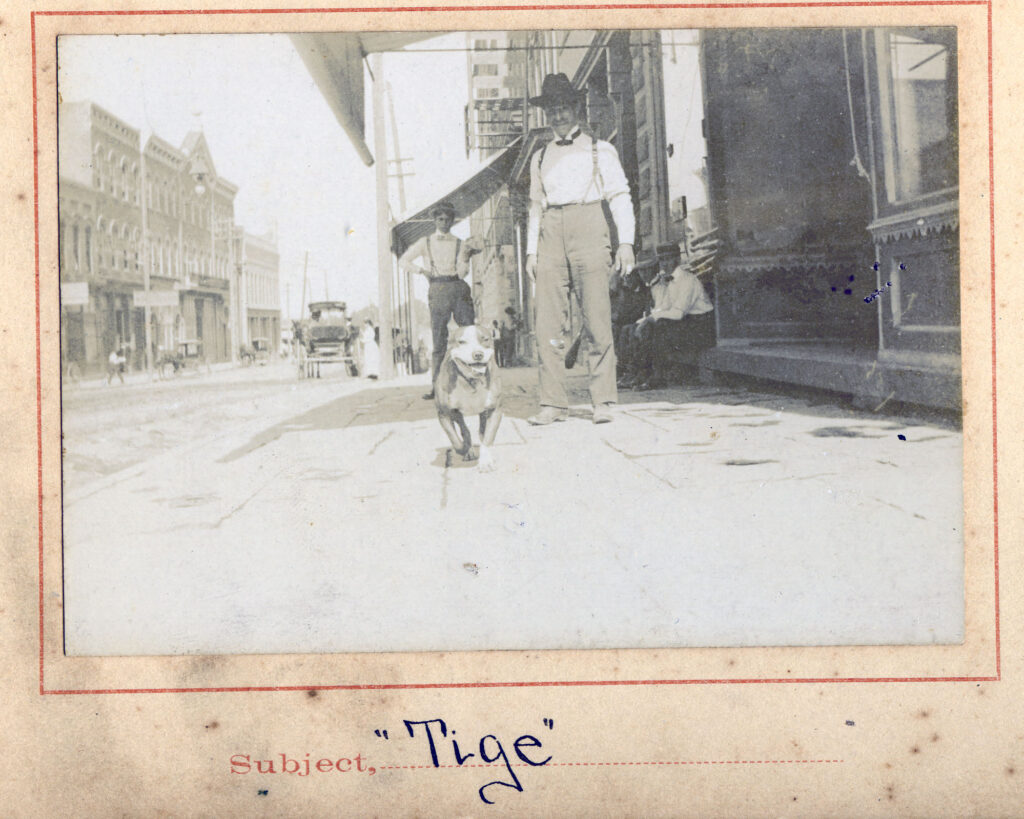
Image of downtown Rock Hill from the White Collection: Courtesy of the WU Pettus Archives – 2024. Note the beautiful Carolina Hotel in the background.
The Yorkville Enquirer reported on Jan. 2, 1876 – “Capt. L.M. Davis, B.N. Craig, and the Frew Brothers occupy the three new store rooms respectively in the Roddey brick building at the corner of Main Street and Depot Street. W.G. Reid, furniture dealer and cabinet workman will occupy the house formerly occupied by Capt. Davis…” Later on Sept. 14, 1876 stating “The town clock is now striking the hours. Capt. L.M. Davis is due credit for his mechanical ability in installing the clock.”
“The Roddey Building is one of the handsomest that can be found anywhere in the South; it is, in fact, the largest building of its kind north of Columbia in the State. The average depth of the stores is about 125 feet and the width about 50 feet, and as a rule they are only two stories high.”
Historian Wm. B. White, Jr. recorded from the Herald on Feb. 3, 1881 – “Capt. Roddey will soon build a new store on the site of his present one. The old building will be removed a short distance to the vacant space on the left of the new store, which will be three story measuring 150-36 feet.”
The Yorkville Enquirer reported on Nov. 17, 1886 – “Capt. W.L. Roddey has been appointed a director in the 3C’s Railroad Company. The S.C. office for the railroad will be help in the banking house of W.L. Roddey and Son.”
The Herald reported on July 7, 1887 – “A colored laborer, Tom Archie, was hurt has week by the collapse of a scaffolding at the new Roddey Building. A full load of mortar on his shoulder fell on his head.” Later on July 21 the paper reported, “Capt. Roddey has decided to put another story on the part of his new building immediately in the rear of the bank. A cellar will be built under that part of the building and an elevator will be included from the cellar to the top level.”
The Yorkville Enquirer reported on Aug. 10, 1887 – “While at work at Roddey’s new building last week, Sam Massey, colored, one of Mr. W.G. Adam’s hands was prostrated by the heat.” Later – “The tinners are now busy putting on the roof of the Roddey Building and the brickwork is almost finished.”
The Herald reported on Oct. 27, 1887 – “Mr. Howard Cobb of Hickory, N.C. has signed a contract with Capt. Roddey to lease the new hotel in the Roddey Block. He has considerable experience as a hotel keeper, and a few years ago managed the Purcell House in Wilmington, N.C.”
The YK Enquirer of Nov. 9, 1887 – “The post office in Rock Hill was moved on Wednesday from the depot to the Roddey Building, just at the entrance to the Globe Hotel. This will be more convenient to our businessmen and more comfortable for our worthy post mistress.” On Dec. 1, 1887 the Herald reported: “The Southern Loan and Investment Co., has opened their books of subscription for stock with a stock of $75,000. It is likely that Capt. W.L. Roddey will be Pres., and Mr. W.J. Roddey will be general manager.”
The RH Herald
The Rock Hill Herald reported on April 7, 1881 – “W.L. Roddey and Co., moved their goods on Monday to Roddey’s Hall. The building from which these goods were taken will be moved a short distance adjacent the store of Mr. J.P. Caston. Capt. Roddey will soon begin the erection of a magnificent building on the site of the old store. On April 14th the paper reported, “the building lately occupied by W.L. Roddey and Co., has been moved and now adjoins the store of Mr. J.P. Caston. It was moved successfully without any damage. On May 12th, 1881 the paper further reported- “Mr. A.D. Holler, the contractor is getting ready to work on Capt. W.L. Roddey’s new brick building.” On May 26th the paper reported – “A large quantity of brick has been made and the foundation of the Roddey building is now complete. The walls will begin immediately.”
On June 9, 1881 the Herald reported further – “The new Roddey building is under construction. The store room will be 150 ft long and 33 ft wide and the hotel will be 100 ft long and 26 ft wide. The building will have an iron front.”
On Aug. 25, 1881 the Herald reported – “Mr. A.D. Holler went to Columbia last week to try and expedite the construction of the iron front of the new Roddey Building.”
The Herald further reported on Sept. 15, 1881 – “The iron front of the new Roddey Building has arrived and has been setup. It now needs to be painted.” Later on Oct. 13, “the brick work on Capt. Roddey’s new building should be completed later this week.”
The Herald reported on Jan. 19, 1882 – “Capt. W.L. Roddey will move into his new building in early February. It is 150 ft long by 36 ft wide. It is built of brick with an iron front and is three stories. The hotel has recently been built adjacent the new store. It is also the property of Mr. Roddey and is 100 ft deep by 62 ft wide. It is also three stories and has about 20 bedrooms. On the first floor is an office and dining room. The third floor of the Roddey Building next door includes sleeping rooms and is connected to the hotel. The first floor of the hotel has the office and dining room. It will be finished in about a month and will be rented to an operator.”
The Herald reported on June 2, 1882 – “Mr. E.E. Post of Highpoint N.C. has rented Mr. Roddey’s new hotel and will open within a few weeks. A kitchen is being added.” On Sept. 7, 1882 the Herald reported – “The new hotel erected with Mr. W.L. Roddey has been named the Globe Hotel. The doors were opened on Monday morning and it is in full operation. The operators are E.E. Post, and S.T. Blair both of High Point, N.C.”
On Feb. 15, 1883 the Yk Enquirer reported – “The Globe Hotel is now under the management of Post and Blair, who are accommodating and efficient and many travelers feel it is the best hotel they have encountered.”
The Rock Hill Herald reported on March 22, 1883 – “Mr. A.J. Kibler, who intends on building a large brick hotel in Lancaster, was in Rock Hill last week examining the Globe Hotel.”
On Sept. 27, 1883 the Herald reported – “The Globe Hotel will now be managed by Mr. John L. Starr of York County. The office of the Southern Telegraph Co., opened recently at the hotel with Mr. William Dillingham as operator. The telegraph line is expected to reach Chester in a few days.”
The Rock Hill Herald of Feb. 14, 1884 reported – “Mrs. Morrison is now the operator of the Glob Hotel, due to illness in the family of John L. Starr.”
The Yorkville Enquirer reported on Oct. 1, 1885 – “Today one of the old landmarks of Rock Hill is being torn down. The old store on Main Street formerly occupied by W.L. Roddey is being demolished and will soon be replaced by a handsome brick building to be occupied by W.L. Roddey and Son as a banking house.”
The Rock Hill Herald reported on Feb. 11, 1886 – “M.D. Plum and Company have opened and will soon have a full stock of clothing and furnishings. ” The same paper contained an ad: “Located at the store room formerly occupied by J.P. Caston and the firm consists of M.D. Blum and J.H. Overcash.”
The Herald reported on April 22, 1886 – “On last Monday, Capt. W.L. Roddey received a private letter stating that the 3C’s railroad has decided on the route through Rock Hill. The engineers, currently in Kershaw County should be in Rock Hill soon.”
The Herald reported on Jan. 20, 1887 – “On Thursday of last week the First National Bank of Rock Hill was opened and is now in full operation. It is a monument to the hard work of Capt. W.L. Roddey, who is the largest share holder.” Later the paper reported on Jan. 27, 1887 on the financial capital raised locally. – “The First National Bank is capitalized at $50,000., all raised in Rock Hill. The Savings Bank of Rock Hill has stock which is entirely owned by Rock Hill people. Rock Hill capital also is invested in two banks in Charlotte, two banks in Columbia, and banks in Chester and Winnsboro. Rock Hill men built and own most of the stock of the Cotton Factory and own nearly all the stock of the Red Bank Factory in Lexington, and are invested in the Fishing Creek and Graniteville Factories.”
At 1:05 in the morning of March 24, 1887 a fire broke out on Main Street. At 2:00 a.m. the flames leaped into the Globe Hotel ( Carolina Hotel), and the Frew Building. It didn’t take long for all of the buildings and warehouses on the west side of Main Street to go up in flames. The post office was torn down in an effort to block the fire’s path which would have destroyed the town library. – Louise Pettus
The Rock Hill Herald announced on April 14, 1887 – “Mr. Warring, an architect from Columbia was in Rock Hill on Monday, he will furnish Mr. Roddey with a plan for a new building. He found that only one wall of the old building was strong enough to be re-used.” On May 5th the paper described the new building as; “The design of the Roddey Block has been completed by the architect and is ready to be bid. The building will be 150 – 92 ft., the front section on Main Street will be three story. The ground floor will have three sections to include the hotel, the dry-good store of W.L. Roddey, and the Roddey Bank. The grocery department will be behind the bank. The hotel ground floor will have an office, barber ship, telegraph office, fatigue room, sample rooms for salesman and two bedrooms. The second floor of the hotel will have eight bedrooms, two parlors, a dining room, kitchen-pantries, and bath room. The third floor will have eighteen bedrooms. The front of the building will be pressed brick with iron columns and will be trimmed with terra cotta. The W.L. Roddey Co. storefront will have plat glass windows. The contract will be let soon and work should be completed by Sept. 1st.” On May 12th Mr. W.G. Adams has secured the contract for the erection of the Roddey Block, he expects to begin laying brick on Monday.”
The Herald reported on Sept. 22, 1887 – “The storehouse of W.L. Roddey and Co., is nearing completion and they expect to move their new stock into the store during the present week.”
The RH Herald reported on Dec. 22, 1887 – “The Carolina Hotel will be opened for business in a few days. The furniture has received and cook and waiters have also been received.”
On Dec. 27, 1888 the Herald reported – “The Carolina Hotel has been reconstructed and is now one of the best hotels in the South. The whole building has been waistcoated and painted in Cherry, and Mr. C.S. Pritchett and Mr. M.B. Morton paper hangers from Charlotte have beautified the walls.”
City Directories and History: 1936 – Capital Barber Shop,
Scrap B. Eastern Portion—this lot measuring 103’ by 212’ was sold by A. T. Black on November 22, 1853, to ‘Squire John Roddey, for $250. Since ‘Squire Roddey was the surveyor who laid off Black’s twenty-three Main Street lots in 1851, it is probable that he had his choice of lots before anyone else was notified that they were for sale. The lot he chose was scarcely a hundred feet from the railroad right of
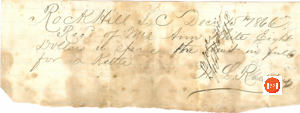
At the end of the Civil War, Mrs. White was purchasing goods from the Roddey Company. Courtesy of the White Family Collection – 2008
way and was, therefore, a likely place for commercial traffic on Main Street. Within three months he had sold the land to Roddey, Wylie and Moffatt, merchants, who erected thereon a frame store house and soon opened a mercantile establishment that was to last for the next seventy-five years. ‘Squire Roddey certainly had an eye for a valuable piece of real estate.
Because the Roddey family owned and/or controlled the businesses that were operated on this half-acre lot, it seems appropriate to trace the history of these firms by recording the names of the various family members who were involved in their operation. ‘Squire John Roddey was married to Mary Grier (“Polly”) (Wylie) Roddey, whose brother Joseph Wylie was one of the leading merchants in Chester County, S. C. David C. Roddey, William Lyle Roddey, and Thomas E. Roddey were sons of Squire John and Mary Grier (Wylie) Roddey. The Roddey entrance into the mercantile business began in Chester District (or County). Here is what we know of their efforts.
Yorkville Enquirer, Thursday, October 24, 1861: Thomas E. Roddey died
Advertisement: Tribute of Respect dated October 19, 1861 from M. A. Moore, Chairman and J. A. May, Secretary, for the Yorkville Enquirer and the Due West Telescope (on motion of Lt. R. M. Kerr) for the death of Thomas E. Roddey, Orderly Sergeant of the Indian Land Guards. The meeting was held “immediately upon the reception of the sad intelligence of the death. . . .” Lt. F. A. Erwin moved that a committee of twelve be appointed to draw up resolutions.
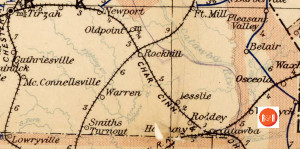
Postal map showing Rock Hill as a transportation hub on two railroads in 1896. Courtesy of the Un. of NC
At the age of fourteen years, Joseph Wylie, who was born in York District in February, 1824, to Thomas Wylie, venerable ruling elder of Neely’s Creek Associate (Presbyterian) Church, moved to Lewisville, Chester District (near present-day Richburg), where he was a clerk in the store of William Moffatt, then the wealthiest man in all that section. He held the clerkship until 1846, when he and his brother-in-law ‘Squire John Roddey bought the Moffatt business, calling it Wylie & Roddey. They remained partners until 1851, when Thomas Henry Moffatt bought the John Roddey interest, the firm being called Wylie & Moffatt.
At this juncture ‘Squire John’s oldest son, David Clarkson Roddey, joined the firm, the name being Roddey, Wylie, and Moffatt, Merchants (usually called “Roddey and Co.”). As given above, they opened a highly successful store in the infant village of Rock Hill in 1854. On January 1, 1858, D. C. Roddey and his brother Thomas E. Roddey joined as partners in D. C. Roddey & Brother at Rock Hill. There were now two different mercantile firms located on the lot in question at Rock Hill: Roddey & Company and D. C. Roddey & Brother. The Civil War began in 1861 and Thomas E. Roddey died in 1861 while in Confederate military service. His wife was Mary G. Brice.
The poor economy brought on by the War soon caused the surviving partner D. C. Roddey, to file for bankruptcy. His health had collapsed in 1865. He died in the summer of 1886, a broken man. He and his brother had borrowed large sums of money to operate their business of merchandising at Rock Hill. One of their principal creditors was their uncle Joseph Wylie. As security for his debts D. C. Roddey had made over one third of the D. C. Roddey & Brother and his one-third interest in Roddey & 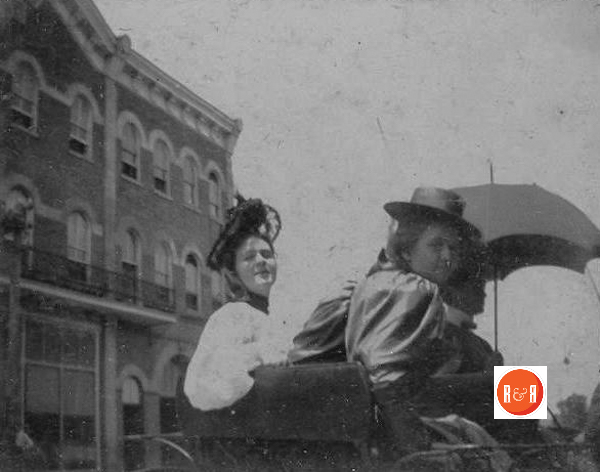 Company to his uncle. But just before his death D. C. Roddey made a deed of assignment of all his estate, real and personal, to Joseph Wylie, to include all the assets of D. C. Roddey & Company and his one-third interest in Roddey & Company. It is clear to see that any remaining assets after the settlement of his estate were the property of Joseph Wylie.
Company to his uncle. But just before his death D. C. Roddey made a deed of assignment of all his estate, real and personal, to Joseph Wylie, to include all the assets of D. C. Roddey & Company and his one-third interest in Roddey & Company. It is clear to see that any remaining assets after the settlement of his estate were the property of Joseph Wylie.
The Yorkville Enquirer reported on June 27, 1888 – “Capt. W.L. Roddey has decided to put an iron balcony on the front of his building.”
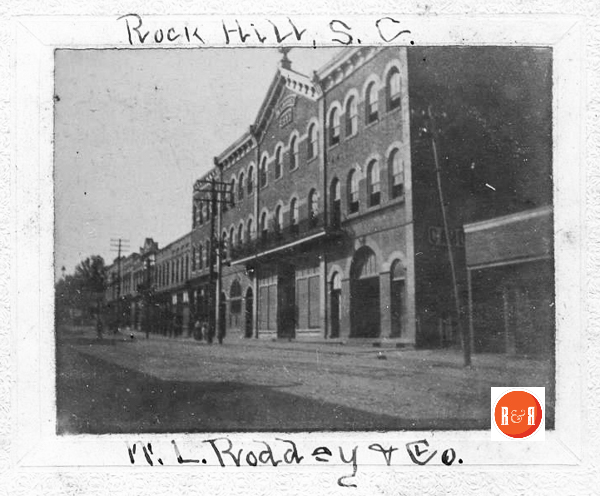
Images of the hotel before remodeling at the turn of the 20th century. Courtesy of the White Family Collection – WU’s Pettus Archives The Rock Hill Herald on Sept. 9, 1891 reported, “When the Roddey Building, in which the post office is located, was erected two years ago the top of the front was injured by a slight sinking of the foundation after a series of heavy rainstorms. This section of wall was taken out Monday and is now being rebuilt.”
Let us go back now to the formation of the firm of Wylie and Moffatt (see paragraph 3 of this section). In the year 1859 William Lyle Roddey, third son of ‘Squire John Roddey, bought one third of the business, now known as Wylie, Roddey & Company. This firm was dissolved during the Civil War, when W. Lyle Roddey entered Confederate service as captain of Company H, 24th South Carolina Volunteers, an outfit that was organized at Richburg, S. C., in 1862.
After the cessation of hostilities Captain Roddey returned home and re-entered business with his uncle Joseph Wylie at Lewisville. The next year, 1866, Wylie and Roddey opened a branch store at Rock Hill. Captain W. L. Roddey and his wife moved to Chester and added Captain J. L. Agurs to the firm, now called Wylie, Roddey and Agurs, with stores at Lewisville, Rock Hill, and Chester
In 1871 the Lewisville store was sold to Whitesides and Marion. Next, Captain Roddey bought out his partners in the Rock Hill store and sold his interests in the Chester store to Wylie & Agurs. 28 In 1885 Agurs retired and Joseph Wylie & Company was organized at Chester.
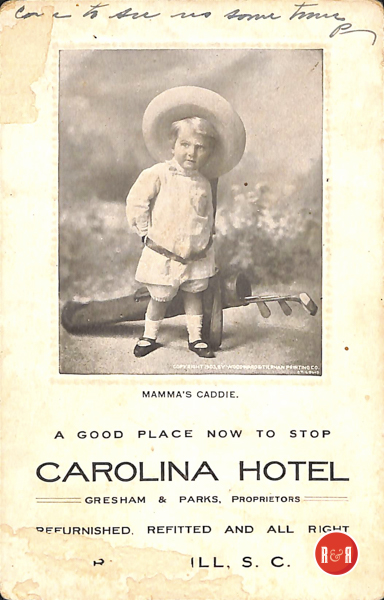
Courtesy of the AFLLC Collection – 2017
The Rock Hill store became W. L. Roddey & Company, which was eminently successful and which lasted until 1893, when a new partnership was created by these men: W. L. Roddey, A. Fletcher Ruff, J. Edwin Roddey (Captain Roddey’s nephew and son of D. C. Roddey), James F. Reid, Samuel L. Reid, and Rufus E. Sadler, using the name Roddey Mercantile Company. After a number of years, a new arrangement was made and the business was called Roddey-Poe Mercantile Company, a firm which lasted well into the twentieth century. In addition to his mercantile interests, Captain Roddey also owned a bank, an insurance company, and a large hotel. The thing to remember is that all these enterprises were operated from the property in question. Again we must commend the foresight of ‘Squire John Roddey. Following the great fire of 1887, which destroyed all the buildings in the first block of Main Street to the east of the railroad property, Captain Roddey erected on his property a large, three-story brick structure, which housed most of the businesses cited above. After the Roddey family lost control of the property at the time of the Great Depression there were innumerable businesses which occupied the site until the Rock Hill urban renewal program of the 1970’s and 1980’s caused the razing of the late Captain Roddey’s headquarters building. The writer recalls the old building well and remembers that the numerals 1 8 8 7 were cut in stone in bold relief at the top of the structure. Tracing the owners to the Roddey lot has not been particularly difficult, since for the most of the years there was only one owner—the Roddey family. The last owner of the building that the author remembers was the late F. D. Marshall, Sr.
RODDEY BUILDING AND CAROLINA HOTEL – Contributed and written by Paul M. Gettys
One of the original lots on Rock Hill’s Main Street was sold by Alexander Templeton Black to John Roddey on November 22, 1853. Since Roddey was the surveyor for the first plat of Main Street, it is possible that he took the lot in payment for his services. Within three months of the purchase, a store opened on this lot, known as Roddey, Wylie and Moffatt. John Roddey, known as “Squire” Roddey, also operated a store at Coates’ Tavern in eastern York County. By 1858, two of John Roddey’s sons, David Clarkson and Thomas E. Roddey were operating the Rock Hill store under the name D. C. Roddey & Brother. Another brother, William Lyle Roddey, bought into the firm in 1859. The Civil War had a great impact on the family, as Thomas E. Roddey died during the war, William Lyle Roddey was severely wounded, and David C. Roddey died shortly afterward in 1866. After his recovery, Capt. William Lyle Roddey resumed the mercantile
business and operated with a number of partners and under a number of names, including W. L. Roddey & Company, Roddey Mercantile, and Roddey-Poe Mercantile.
All these stores operated on the same site. Little is known about the store buildings. Presumably, the original store was enlarged over the years into a larger wood frame building. William Lyle Roddey became one of the leading entrepreneurs of Rock Hill, investing in real estate, banking, textile mills, and civic improvements. At some point, the Globe Hotel was created at the Roddey Mercantile building, along with offices for some of his other enterprises.
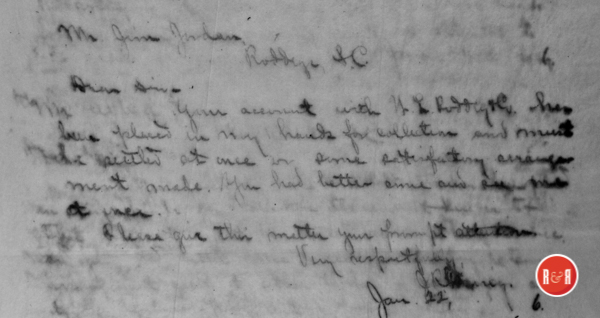
Collection notice from the Roddey Mercantile Co., to Jim Jordan of Roddy, S.C. Courtesy of the RRF Collection 2020
Rev. J.C. McMillan – March 13, 1896
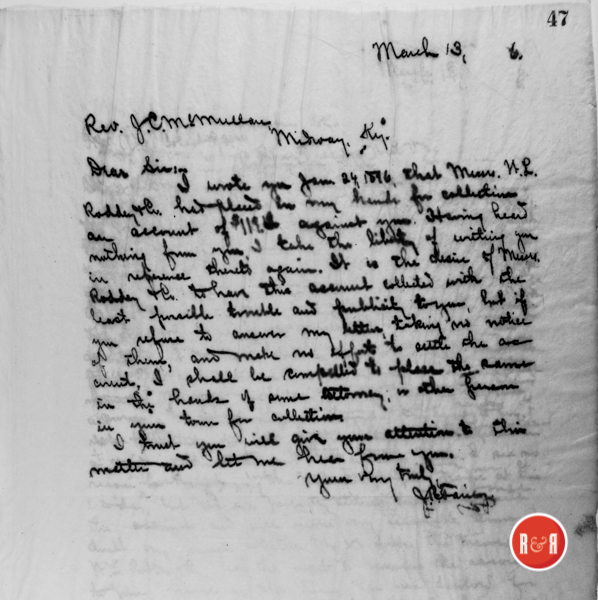
Mr. S.W. Moore (Elgin SC) April 2, 1896
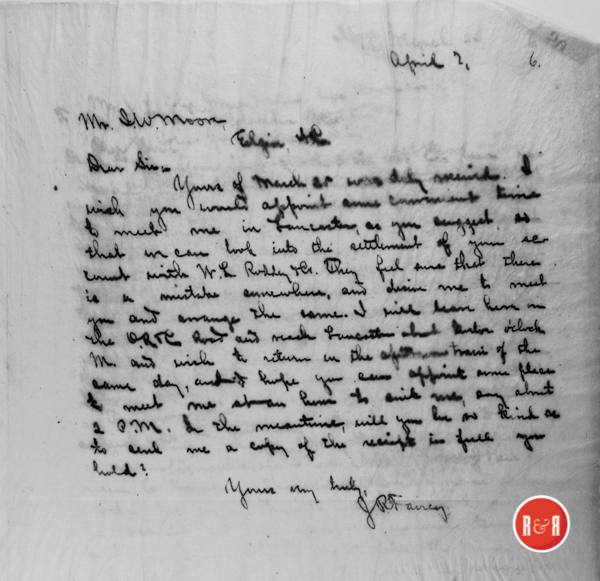
A great fire swept through the south side of Main Street in 1887, taking with it the entire Roddey complex. After the fire, Capt. William Lyle Roddey erected a new building on the same lot in 1888. An article from the Yorkville Enquirer described the new building. Erected at a cost of $18,000, it was a three-story brick building which housed a number of enterprises. On the first floor, the W. L. Roddey & Company store was one of Rock Hill’s leading mercantile establishments. Also on the first floor were the First National Bank offices, the post office, the Enterprise Telephone Company office, and the Carolina Hotel reception area and office. The Carolina Hotel occupied the upper floors, and featured 32 rooms complete with all modern amenities, such as electric call bells, speaking tubes, and baths. The article deemed that the Carolina Hotel “compares favorably with any hotel in the state outside Charleston.” Mr. Howell Cobb was the proprietor of the hotel. Mr. Roddey acquired hunting rights on 12,000 acres of land for the use of the hotel’s guests.
The Abbeville Press and Banner reported on Sept. 8, 1886 – Carried a report from Rock Hill concerning the earthquake of Sept. 1st which stated, “A loud rumbling occurred and people thought the Globe Hotel would fall. Citizens carried lamps into the street for fear they would brake and start a fire in their homes. Ladies and children were crying and the bravest men were frightened.”
The Yorkville Enquirer of Nov. 9, 1887 stated, “The Rock Hill Post Office was moved last week from the depot to the Roddey Building at the entrance to the Globe Hotel.”
The Charleston News and Courier of June 7, 1890 stated – “Another very prosperous institution is the Southern Loan and Investment Company. It was organized in 1888 and the management is under the following officers: Capt. W.L. Roddey, Pres., W.J. Roddey, Manager and Treasurer., and directors: W.L. Roddey, W.J. Roddey, S.L. Reid, J.E. Roddey, J.R. Miller, and J.F. Reid. The office of this company are in the Roddy Building.”
The Yorkville Enquirer on Jan. 7, 1891 – “Mr. V.L. Norman is the new prop. of the Carolina Hotel.”
The YV Enquirer reported on Jan. 25, 1893 – “Capt. W.L. Roddey wishes to retire from the mercantile business. He began business in Rock Hill in 1866. His firm W.L. Roddey and Co., will be reorganized and will become the Roddey Mercantile Company with a capital stock of $50,000. The corporators are: W.L. Roddey, J.E. Roddey, J.F. Reid, S.L. Reid, A.F. Ruff, and R.E. Sadler.”
The Herald reported on Feb. 1, 1893 – “The firm of W. L. Roddey and Company is being dissolved and subscriptions are open for stock in a new company which will replace it, to be known as Roddey Mercantile Company. J. F. Reid and S. L. Reid will hold the same positions held in the old firm.”
The Yorkville Enquirer on Feb. 15, 1893 reported on a fire in Rock Hill. People who were skating in Roddey’s Hall noticed smoke coming from one of the store rooms below. Hope and Evans was seriously damaged and the fire was destroyed in the oil room in the rear of their store. Also damaged were J.W. O’Neal and Company and T. P. Roddey, whose stocks were damaged by water.
The Rock Hill Herald reported on May 2, 1896 – “On the meeting of the stock holders of the People’s Building and Loan Association, which was held to complete the organization of the association and to elect a board of directors. Elected to the board were: Thomas L. Johnston, W.J. Roddey, John A. Black, V.B. McFadden, J.E. Roddey, W. J. Rawlinson, J.B. Johnson, Julius Freidheim, and J. H. Miller. Officers are; W. J. Roddey, Pres., Thomas L. Johnston, V.P., J. H. Miller, Sec – Treas. and W.B. Wilson, Solicitor.”
The Herald reported on July 15, 1899 – “The Roddey Mercantile will renovate and reconstruct their mammoth store building. The National Union Bank will take possession of space in Capt. Roddey’s new building on the corner across the street. When that move is complete, contractors will begin work on reconstruction of the old Roddey Building. The space once used by the bank will become part of the mercantile company. There will be new skylights and the entire storefront will be remodeled in a modern manner giving ample windows for show purposes.”
The Herald reported on Jan. 30, 1901 – “The Rt Rev. George Wylie Clinton, the Bishop of the AME Zion Church with residence in Charlotte, was a citizen of Rock Hill some twenty years ago and at that time he was a porter in the store of W.L. Roddey and Company. He is now one of the leading colored men of the South.” (Note the W.L. Roddey donated much of the land on which Clinton College was constructed.)
The Herald reported on July 23, 1902 – “Architect H.E. White is completing plans for a complete remodeling of the store of Roddey Mercantile Company. There will be a vestibule running the full width of the store and a front of plate glass with large show windows.”
The Rock Hill Herald reported on Nov. 15, 1902 – “Mr. A.H. Greene went to Chester to assume charge of the Hotel Nicholson for two weeks. His son, G.H. Greene, is now in charge of the Carolina Hotel in Rock Hill.”
The Herald reported on June 6, 1903 – “For the last two nights their were ninety quests registered at the Carolina Hotel.”
The RH Record reported on Oct. 15, 1908 – “There was a fire in the kitchen of the Carolina Hotel last night. The fire company came and quickly had it under control. The Roddey Mercantile Store was filling with smoke and had some water damage.”
The Rock Hill Record reported on Nov. 5, 1908 – “Work of remodeling the Carolina Hotel is underway. J.J. Keller and Co., have the contract to build new rooms, move the kitchen and dining room down stairs and add fourteen rooms upstairs. Mr. Parks is the Manger.
An article in the Evening Herald (May 3, 1952) describes the later history of the Carolina Hotel. In 1895, it was operated by A. H. Greene, and Gib Greene was the room clerk. The Carolina later became known as the Southern Hotel, and J. K. Scoggins, Jr. was a well-known manager. During the Great Depression of the 1930s, the Roddey family lost control of the property. In 1941, the hotel was bought by F. D. Marshall, Sr. It was later owned by his son Robert Marshall and was known as the Hotel Robert Marshall. It was leased and operated by Herman Baruch and later W. T. Kincaid. In 1952, Theodore A. Baker took over the management and began remodeling the hotel. The urban renewal program undertaken by the City of Rock Hill resulted in the demolition of the Roddey Building, one of Rock Hill’s landmarks.
The SC Architects: 1885 – 1935, Wells and Dalton, 1992 states, “a remodeling project was undertaken on the hotel in 1901 by architect Frank C. Walter, of the Firm of Walter and LeGare.”
The SC Architects: 1885 – 1935, Wells and Dalton, 1992 reported “a remodeling project was taken for the Carolina Hotel in 1911 by Architect Charles C. Hook at a cost of $10,000.”
The RH Record on Nov. 21, 1907 – “Mr. H.E. White, architect, is moving his offices from the White Building to the rooms over the Roddey Mercantile Co. In the White Building lumber is being placed for repairing the hall for use as a lodge room for some of the lodges of the city.”
The Record reported on July 2, 1908 – “Mr. Parks, Manager of the Carolina Hotel, has rented the new residence erected by Mr. Ed Barron in the Hutchison Grove, and will move his family in this week.”
The Record reported Aug. 31, 1908 – “Mr. Parks, who has been managing the hotel here, under the name Gresham and Parks, has bought Gresham’s interest and will manage by himself. Mr. Parks has been here about eight months.”
The Rock Hill Record contained an add on Jan. 3, 1927 for the Carolina dining room under the management of Mrs. R.H. Moore, “Breakfast for .50, diner .65, and super for $.75.”
The Record reported on Jan. 31, 1927 – “That the Carolina Hotel will change its name to the Southern Hotel. The interior has been renovated. The Rose and Tearoom will move from Caldwell Street to the Hotel and will continue to be operated by Ms. Anna Poe and Mrs. Rose Renfro.
The Record reported on April 16, 1923 – “W.W. Marmaduke, proprietor of Hotel Carolina, left today for Jacksonville Florida for the state convention of Florida Hotel men.
The Herald reported Jan. 2, 1926 – “That the Belk Company opens a store in the former Roddey – Poe Building.”
Click HOME to return to the numbered site tour of Rock Hill’s downtown.
Stay Connected
Explore history, houses, and stories across S.C. Your membership provides you with updates on regional topics, information on historic research, preservation, and monthly feature articles. But remember R&R wants to hear from you and assist in preserving your own family genealogy and memorabilia.
Visit the Southern Queries – Forum to receive assistance in answering questions, discuss genealogy, and enjoy exploring preservation topics with other members. Also listed are several history and genealogical researchers for hire.
User comments welcome — post at the bottom of this page.
* Reprinted from South Carolina in the 1880s: A Gazetteer by J.H. Moore, Sandlapper Publishing Company – 1989
Please enjoy this structure and all those listed in Roots and Recall. But remember each is private property. So view them from a distance or from a public area such as the sidewalk or public road.
Do you have information to share and preserve? Family, school, church, or other older photos and stories are welcome. Send them digitally through the “Share Your Story” link, so they too might be posted on Roots and Recall.
User comments always welcome - please post at the bottom of this page.
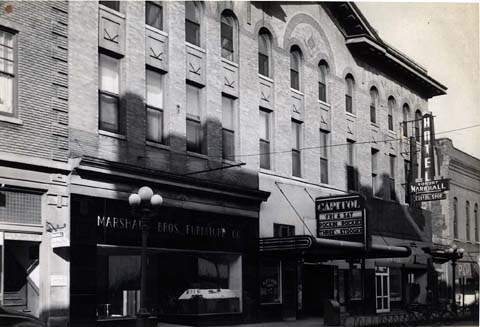
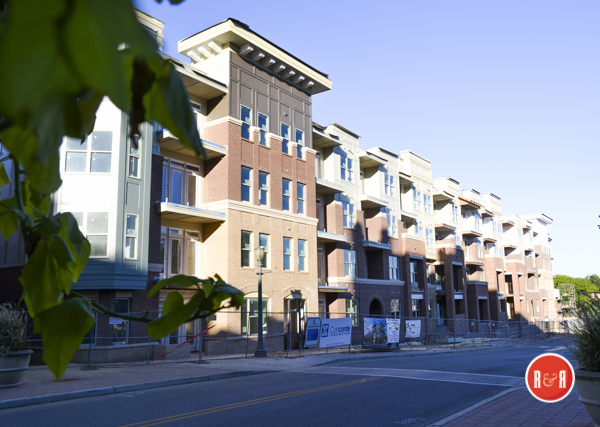
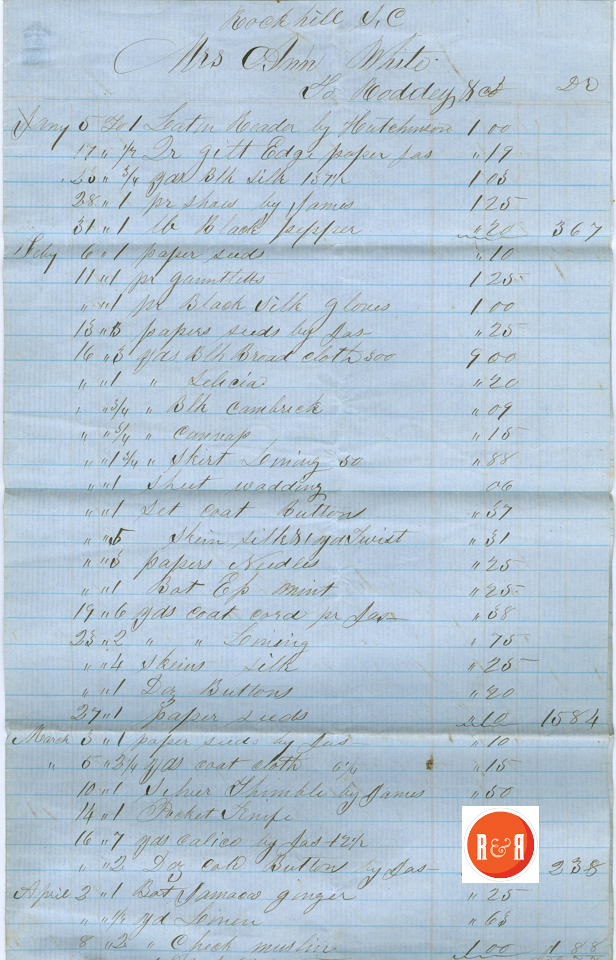
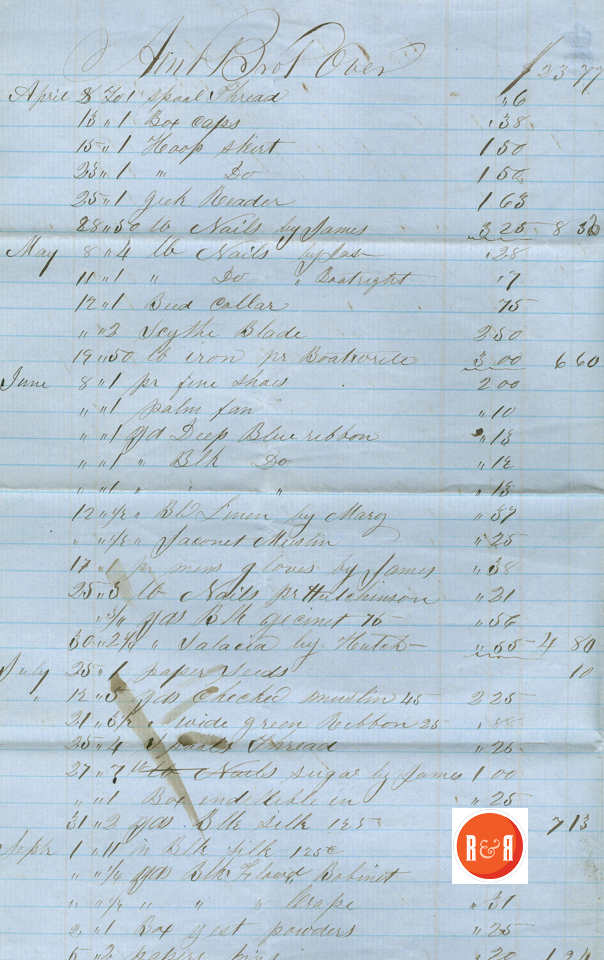
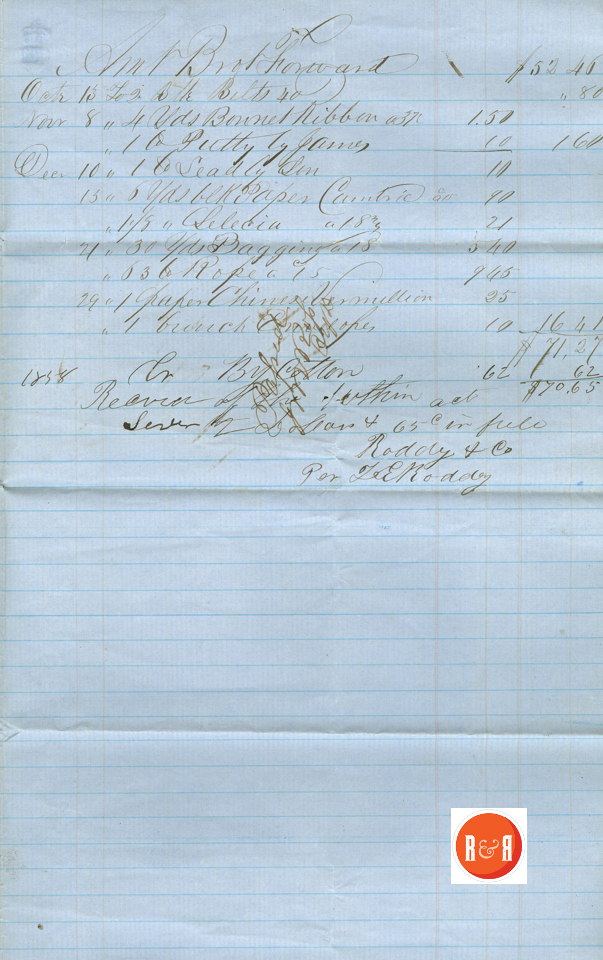
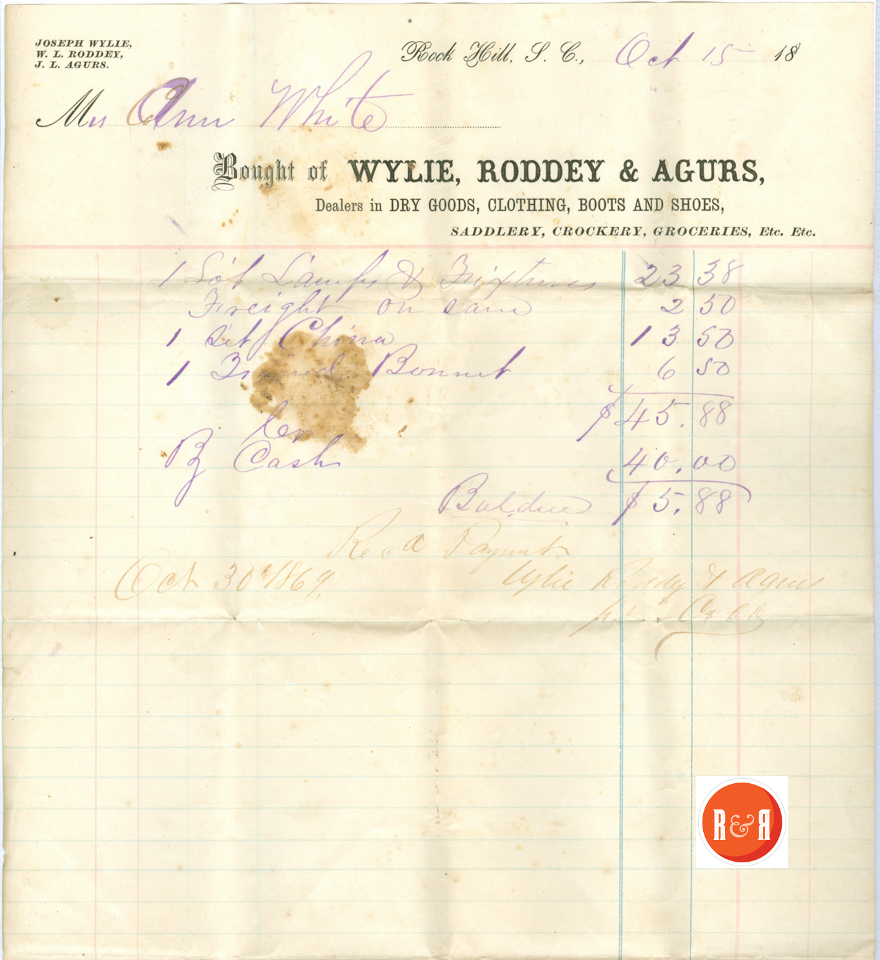

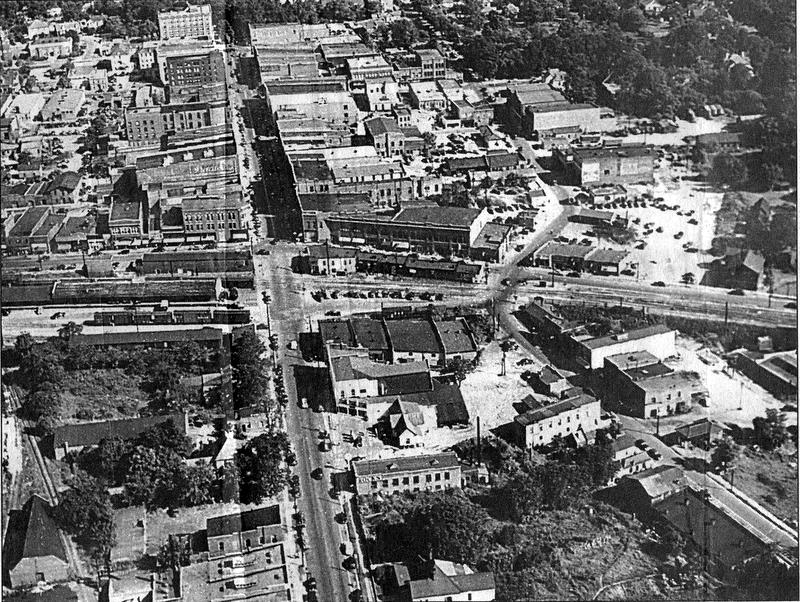
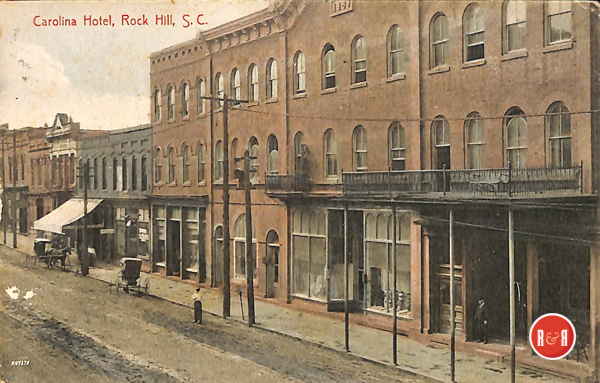
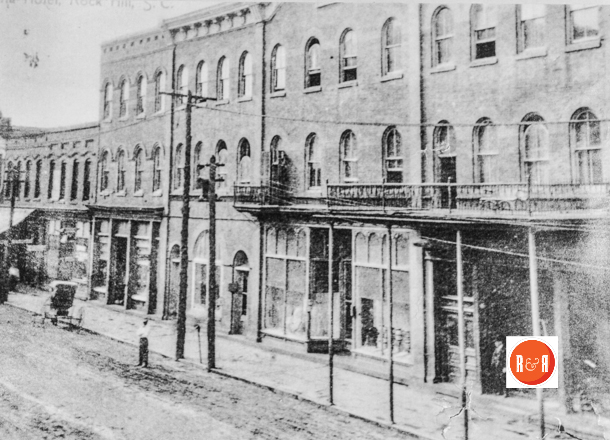
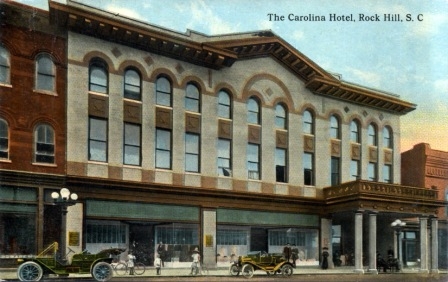
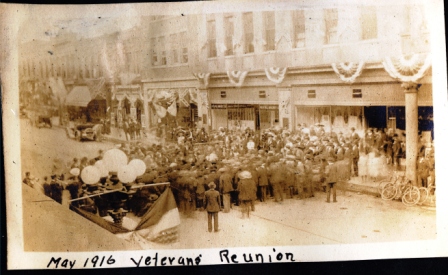
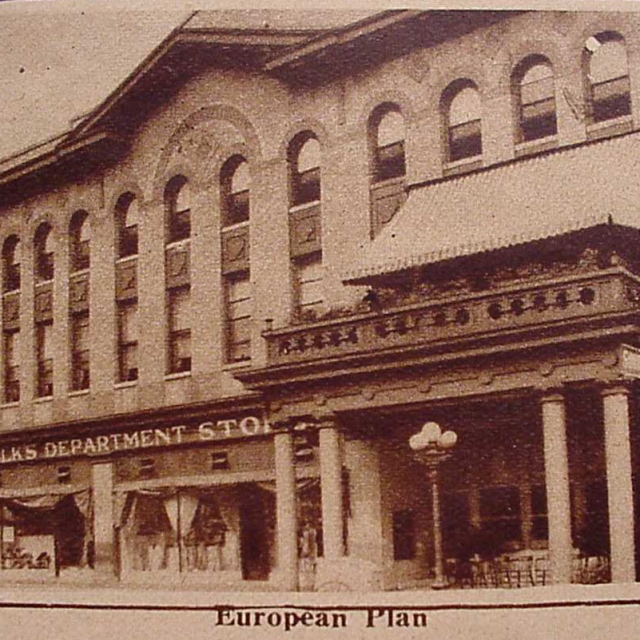
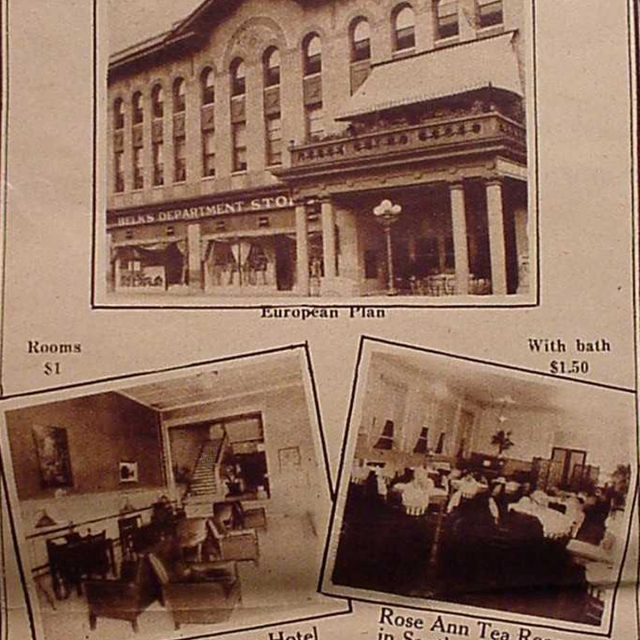
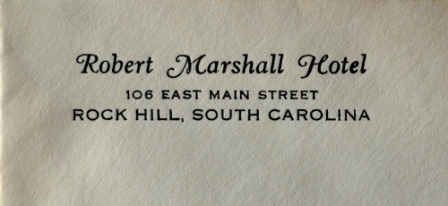
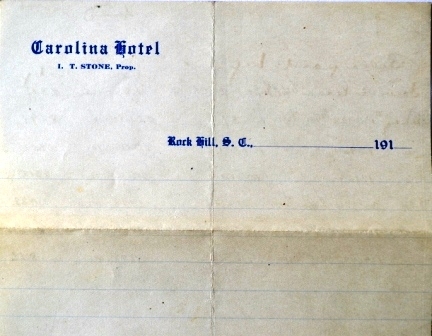
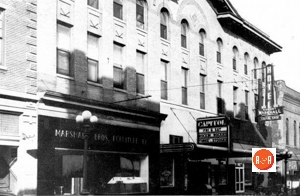
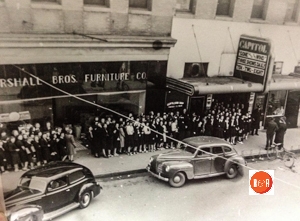
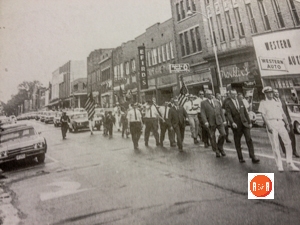

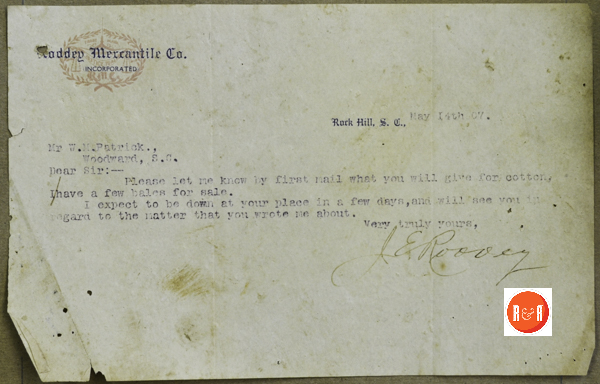


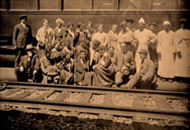
Share Your Comments & Feedback: